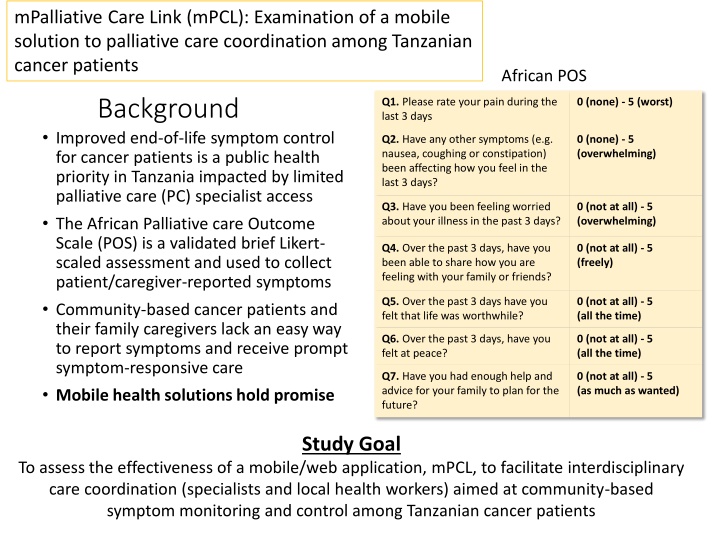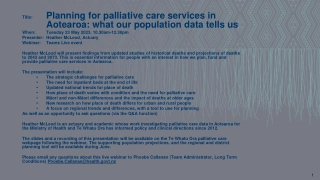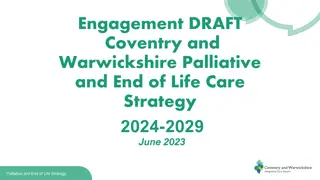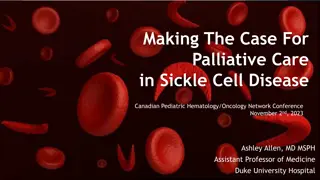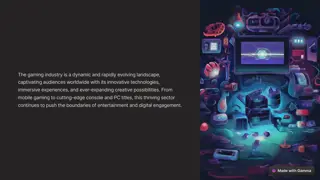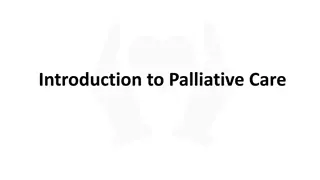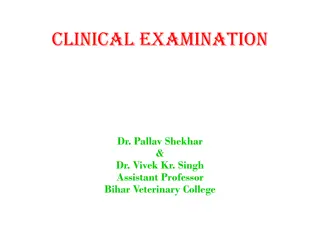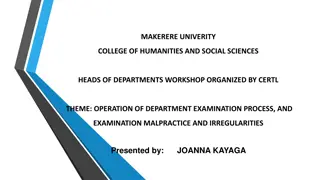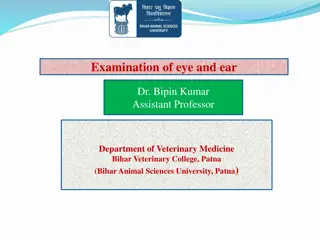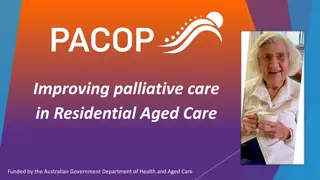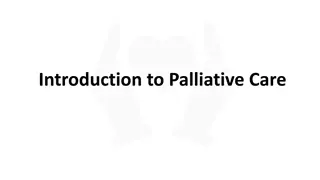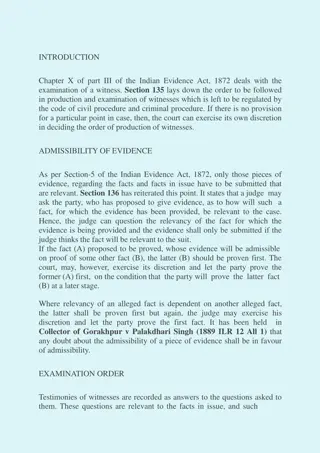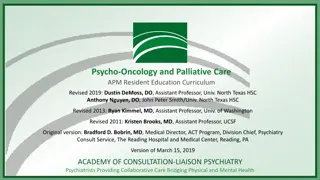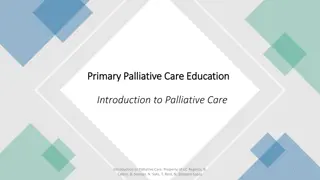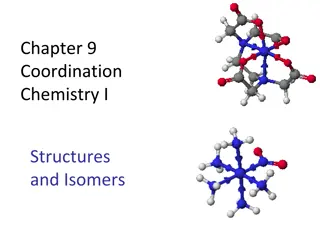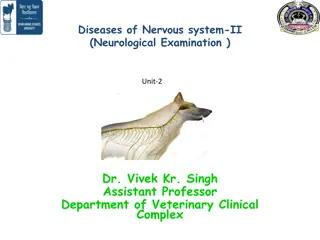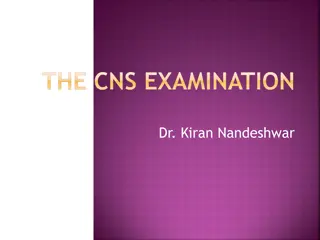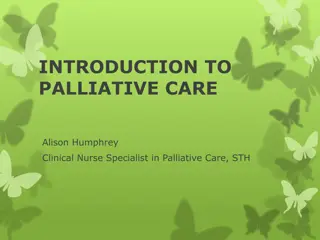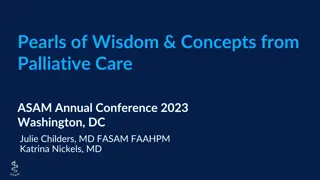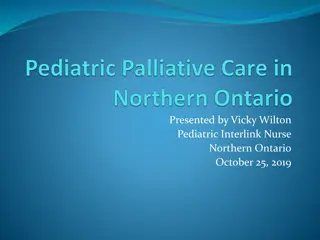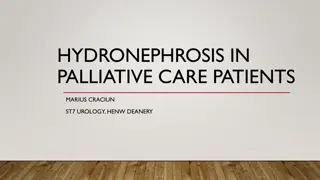mPalliative Care Link (mPCL): Examination of Mobile Palliative Care Coordination Among Tanzanian Cancer Patients
Improved end-of-life symptom control is a priority in Tanzania due to limited palliative care access. mPCL is a mobile solution aimed at coordinating care for community-based cancer patients through symptom monitoring. The study assesses the effectiveness of mPCL in interdisciplinary care coordination using the African Palliative Care Outcome Scale (POS).
Download Presentation

Please find below an Image/Link to download the presentation.
The content on the website is provided AS IS for your information and personal use only. It may not be sold, licensed, or shared on other websites without obtaining consent from the author.If you encounter any issues during the download, it is possible that the publisher has removed the file from their server.
You are allowed to download the files provided on this website for personal or commercial use, subject to the condition that they are used lawfully. All files are the property of their respective owners.
The content on the website is provided AS IS for your information and personal use only. It may not be sold, licensed, or shared on other websites without obtaining consent from the author.
E N D
Presentation Transcript
mPalliative Care Link (mPCL): Examination of a mobile solution to palliative care coordination among Tanzanian cancer patients African POS Background Improved end-of-life symptom control for cancer patients is a public health priority in Tanzania impacted by limited palliative care (PC) specialist access The African Palliative care Outcome Scale (POS) is a validated brief Likert- scaled assessment and used to collect patient/caregiver-reported symptoms Community-based cancer patients and their family caregivers lack an easy way to report symptoms and receive prompt symptom-responsive care Mobile health solutions hold promise Q1. Please rate your pain during the last 3 days 0 (none) - 5 (worst) Q2. Have any other symptoms (e.g. nausea, coughing or constipation) been affecting how you feel in the last 3 days? 0 (none) - 5 (overwhelming) Q3. Have you been feeling worried about your illness in the past 3 days? 0 (not at all) - 5 (overwhelming) Q4. Over the past 3 days, have you been able to share how you are feeling with your family or friends? 0 (not at all) - 5 (freely) Q5. Over the past 3 days have you felt that life was worthwhile? 0 (not at all) - 5 (all the time) Q6. Over the past 3 days, have you felt at peace? 0 (not at all) - 5 (all the time) Q7. Have you had enough help and advice for your family to plan for the future? 0 (not at all) - 5 (as much as wanted) Study Goal To assess the effectiveness of a mobile/web application, mPCL, to facilitate interdisciplinary care coordination (specialists and local health workers) aimed at community-based symptom monitoring and control among Tanzanian cancer patients
Methods Design: Field study of untreatable cancer patients randomized at discharge from a large urban Tanzanian cancer hospital to mPCL (intervention) or phone contact for POS collection Data Collection: Baseline sociodemographic, clinical and POS data POS responses collected twice-weekly and managed via mPCL versus via phone-contact with study personnel in mPCL and non-mPCL arms, respectively for up to 4 months Patient end-of-study care satisfaction assessed via phone survey Analysis: Baseline characteristics, POS score trajectories & end of study survey results analyzed by group and compared mPCL Built on cloud-based, open-source, HIPPA-compliant CommCare platform Smartphone/web accessible Interfaces for specialists, local health workers, and patients/caregivers for symptom collection and control via community-based interdisciplinary care coordination
Results Average POS item scores by group with comparisons Pain 5 mPCL (p = 0.0002) Time (p = 0.0001) mPCL * Time (p = 0.03) 4 98 patients completed study (n=49/arm) 3 mPCL Phone Contact 2 There were more women and cervical cancer patients plus higher use of discharge morphine in the mPCL vs phone-contact arm 1 0 Feels life is worthwhile Worry 5 mPCL (p = 0.0001) Time (p = 0.008) mPCL * Time (p = 0.16) 4 3 2 mPCL (p<0.0001) Time (p=0.14) mPCL*Time (p=0.27) Near-equal numbers of participants/arm died within the study period (n=27 and 29 mPCL vs phone-contact, respectively) 1 0 Feels at Peace Other Symptoms 5 mPCL (p < 0.0001) Time (p = 0.01) mPCL * Time (p = 0.03) 4 3 2 mPCL (p<0.0001) Time (p=0.14) mPCL*Time (p=0.02) 1 0 0 2 4 6 8 10 12 14 16 Week 0 2 4 6 8 10 12 14 16
Conclusions Symptom severity scores were significantly higher in the mPCL arm across the study period compared with phone-contact arm Between-group sociodemographic/clinical differences, unintended additional support provided through phone-contact coupled with a potential bias posed by phone collection of POS responses likely explain some of these findings Symptoms decreased over time in both arms, likely reflecting cumulative deaths Post-intervention assessment of quality-of-care revealed near-equal satisfaction between the two arms Limitations included small sample size and lack of true usual care group As access to phone-based palliative care is not generalizable or sustainable, a larger randomized study of mPCL to study its cost-effectiveness and impact on clinical outcomes throughout Tanzania is needed to assess the true value of this innovation *Dr Mamsau Twalib Ngoma Phone:+255685377273 email: mamsaungoma@yahoo.com Address: Ocean Road Cancer Institute P.O Box 3592 Dar es Salaam, Tanzania Mamsau Ngoma*, Beatrice Mushi, Robert Morse, Twalib Ngoma, Habiba Mahuna, Kaley Lambden, Y Xian Ho, F Lee Lucas, Joshua Mmari, Susan Miesfeldt *corresponding author Supported by the National Institutes of Health Fogarty International Center (Grant award no. R21 TW010190)
